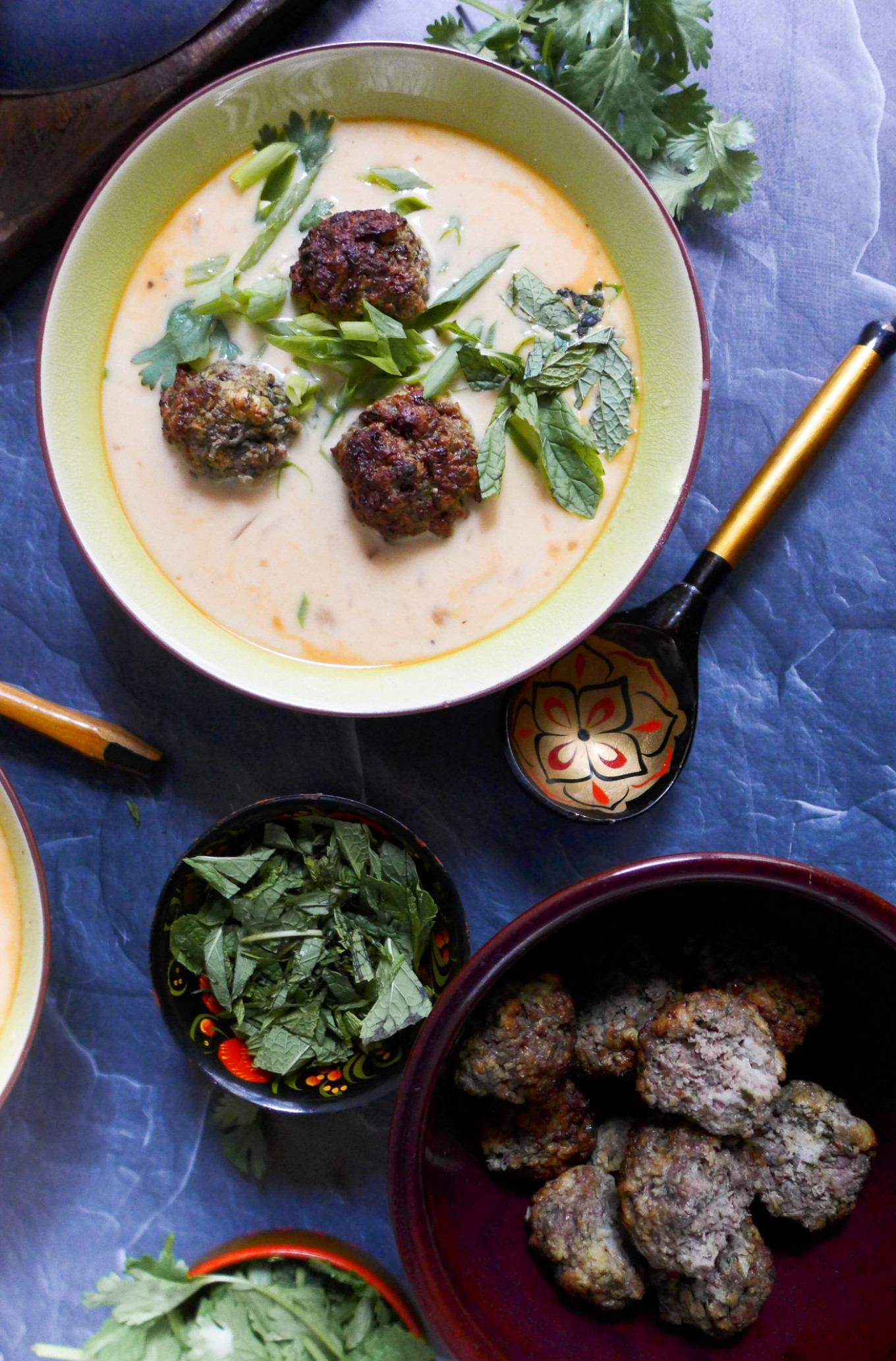This week the light shifted, the temperature dropped and just like that, it’s soup season! Longtime readers of this column will know that this is cause for glorious celebration in my household: the first order of business was to unearth my largest soup pot, which had languished all summer at the back of the pantry. I dusted it off, and put it immediately to work on the stovetop, where it is likely to remain in constant use until next May.
Autumn happens quickly in Eastern Europe with very few of the bright, crisp days filled with fiery foliage and tart apples I associate with my native New England. For that, one needs to head south to the rugged but balmy Caucasus, where autumn lingers far longer; the hot, clear days are perfect for the final apogee of September and October’s jewel-toned bounty: grapes (of course) but also plums, quince, eggplant, peppers, and tomatoes.
The Caucasus and its magnificent cuisine, which is so delightfully woven into the fabric of Russia’s own, are very much on my mind this week: I got ahold of an excellent matsoni starter, which I immediately used to make an extra-large batch of that yogurt-like product, which is ubiquitous in the three Caucasian nations of Armenia, Azerbaijan, and Georgia. Matsoni, which brims with probiotics, is often credited with the region’s astonishing life-expectancy, where centenarians are quite commonplace. And while the mountain air, heady wine of the region, and general active lifestyle play their role in prolonging life in the Caucasus, fermented milk products are also a factor in that other long-lived nation, Japan, where matsoni — known there as “Caspian Sea Yogurt”—is wildly popular.
Matsoni (მაწონი in Georgian and մածուն in Armenian) is similar in taste and texture to yogurt, but depending on location, starter, and the type of milk used — sheep, goat, cow, buffalo, or a combination of these are common — the microbiota can vary widely. In many studies designed to determine the key yeast that makes matsoni so healthy, scientists and dieticians have identified a wide range of yeasts from the common L. bulgaricus, to L. acidophilus, S. thermophilus, Lactococcus lactis, L. lactis subsp. cremoris, Geotrichum candidum, Saccharomyces, Candida, and others, all of which promote excellent gut health and are key to addressing any digestive disorders.
The method of production of matsoni is similar to that of yogurt: milk is heated to 35-42ºC, inoculated with a small portion of matsoni, then allowed to culture overnight. Drained of its whey and chilled, matsoni thickens to a yogurt consistency. Undrained and unset matsoni makes a popular beverage in the region; drizzled with honey and topped with fruit, matsoni is a popular breakfast fare. It is also a key ingredient in several popular Caucasian meat and vegetable dishes, where it is often juxtaposed with something spicy — a classic pairing that recalls the strong Zoroastrian and Persian influence on Caucasian cuisine. But my current obsession — and what I will make from that vast vat of matsoni — is a hot soup, popular in all three Caucasian nations.

I was first introduced to hot matsoni-based soup in Georgia during a golden autumn where the nights had only a hint of chill and the days were hot and bright — perfect weather for picking grapes and celebrating the harvest in an expansive outdoor supra or banquet. I have since tried to pinpoint an original recipe, but there are more versions of this soup in the Caucasus than I’ve had khachapuri. Armenians call it “spas” or “kyalagyosh” and the Georgians call it “tsivi matsvinis shechamdi,” or “dovga.” While the base of matsoni, flour, and egg tempered with hot stock is common to each, what goes into the soup is open to wide interpretation: there are excellent versions with lentils, wheat berries, barley, and even rice. Some lighter versions feature only chopped herbs and are administered to anyone who is under the weather.

My favorite version, however, features small meatballs, seasoned with the region’s favorite flavor notes of coriander, sumac, and cumin, and finished with a generous handful of fresh herbs, including mint. The meatballs make a wonderful contrast to the silky smoothness of the matsoni and egg broth.
The quest for the original recipe will probably last a lifetime, but in the meantime, why not inaugurate soup season with the recipe below, which makes a filling and healthy dish for lunch or dinner? You can dial up the heat on the recipe by using a heavy hand with the final garnish of red pepper, or simply leave it as it is: tangy, delicious, and possibly life-extending. Who knew the fountain of youth flowed with fermented dairy from the Caucasus?
Spicy Caucasian matsoni soup with meatballs
Ingredients
For the meatballs
- 1 cup (235 ml) fresh breadcrumbs
- ⅓ cup (80 ml) milk
- 1 lb (500 grams) ground beef, lamb, or a combination of both
- 1 Tbsp dried mint or 1/4-cup (60 ml) finely chopped fresh mint
- 1 tsp ground cumin
- 1 tsp coriander seeds
- ½ tsp white pepper
- 1 small shallot, finely minced
- 1 tsp minced garlic
- 2 egg yolks
For the soup
- 1 Tbsp olive oil
- 1 small yellow onion
- 1 tsp ground coriander
- 2 tsp sumac
- ½ tsp Aleppo pepper
- 1 tsp salt
- 2 cups (475 ml) matsoni or Greek yogurt*
- 2 Tbsp flour
- 2 eggs
- 4 cups (1 liter) chicken broth
- 2 Tbsp dried mint or ⅓ cup of fresh mint
To garnish:
- ¼ cup (60 ml) fresh cilantro
- ¼ cup (60 ml) fresh mint, thinly sliced
- 4 scallions, thinly sliced on the diagonal
- Aleppo pepper or hot sauce if desired
*Matsoni is a popular item in most grocery stores in the former Soviet Union. Outside of those countries, look for it in specialty grocery stores. If you are interested in making your own, order a starter culture from Cultures for Health, and follow the directions on the package. Greek Yogurt is an acceptable substitute for this recipe.

Instructions
Make the meatballs
- Preheat the oven to 425ºF (220ºC) and line a baking sheet with parchment paper or prepare an air fryer at 350ºF (180ºC).
- Warm the milk until it is about to simmer. Remove from heat and add the breadcrumbs to the milk and toss to combine. Cover and set aside for 20 minutes to allow the crumbs to absorb the liquid.
- Finely mince the onions, garlic, and spices together.
- Gently combine the ground beef, bread crumb mixture, onions, and spices and the two egg yolks together with clean hands.
- Wet your hands with cool water and roll the meat mixture into 20-25 small meatballs about the size of a large marble.
- Bake the meatballs for 25 minutes in the pre-heated oven or air fry them for 10 minutes.
Make the soup
- Sauté the onions in the oil over medium low heat in a medium-sized soup pot, stirring to ensure that the onions do not scorch. When the onions are translucent, add the dried spices and salt and toss to combine. Sauté for a further 5 minutes after adding the spices, then set the pot aside to cool completely.
- While the onion mixture is cooling, heat the chicken stock until it is just simmering.
- Once the onion mixture has cooled completely, whisk together the flour, yogurt or matsoni and the egg yolks in the cooled soup pot. Add the heated chicken stock slowly to the mixture, whisking steadily as you do. Return the pot to low heat and stir gently but continuously until the mixture thickens slightly (about 3-5 minutes). Add the meatballs to the soup and heat through. Garnish with the scallions, cilantro, mint, and red pepper. Serve immediately.
A Message from The Moscow Times:
Dear readers,
We are facing unprecedented challenges. Russia's Prosecutor General's Office has designated The Moscow Times as an "undesirable" organization, criminalizing our work and putting our staff at risk of prosecution. This follows our earlier unjust labeling as a "foreign agent."
These actions are direct attempts to silence independent journalism in Russia. The authorities claim our work "discredits the decisions of the Russian leadership." We see things differently: we strive to provide accurate, unbiased reporting on Russia.
We, the journalists of The Moscow Times, refuse to be silenced. But to continue our work, we need your help.
Your support, no matter how small, makes a world of difference. If you can, please support us monthly starting from just $2. It's quick to set up, and every contribution makes a significant impact.
By supporting The Moscow Times, you're defending open, independent journalism in the face of repression. Thank you for standing with us.
Remind me later.







